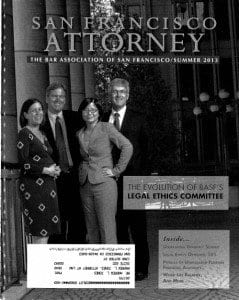
Reader’s note: as of September 2018, the Offshore Voluntary Disclosure Program (OVDP) referenced here is closed. In its place, for certain qualified individuals, are the options of the Streamlined Foreign Offshore Procedures and Streamlined Domestic Offshore Procedures (and the less-common option of a non-program disclosure arguing reasonable cause).
By Andrew Jones
As attorneys, we know that many of our clients have secrets – secrets they keep from their spouses, secrets they keep from their families, and sometimes, to our surprise, secrets they keep from us. Since 2009, and with increasing frequency in 2012 and into 2013, tax attorneys have seen a steady and increasing flow of individuals – previous clients and new clients – seeking advice on addressing their secret, undisclosed foreign financial accounts.
The question for tax attorneys, for attorneys in allied fields (like estate planning), and for fellow professionals like CPAs and wealth planners and managers, is how to assist these individuals.
Tax and Criminal Consequences of an Undeclared Foreign Account
Helping these individuals requires knowing, at minimum, their level of exposure – and in the case of undisclosed foreign accounts, it’s significant. A US individual whose undisclosed account is discovered by the IRS or Department of Treasury is in a world of hurt. As a baseline matter, the IRS will typically pursue at least six years of unpaid taxes, interest, and standard failure-to-pay or failure-to-file penalties. But as bad as these can be, they often resemble a rounding error in the overall civil schema.
The true danger lies in the FBAR penalty. Where the IRS believes that the failure to report a foreign account was willful, it will impose a penalty equal to 50% of the high account value within the year of non-reporting. Worse yet, that penalty may be applied to up to six total years of prior non-reporting, assessed cumulatively.
For a $5 million, FBAR-triggering, willfully undeclared foreign account, open for the past six years, the IRS would be empowered to propose a $15 million penalty – calculated as 50% of the high account value ($2.5 million) for each of the prior six years.
A lower $10,000 penalty applies where the US person only negligently (not willfully) fails to file the FBAR. Unfortunately, as the November 2012 decision in United States v. McBride shows, the IRS is finding judicial traction on its theory that merely checking ‘No’ in response to the Form 1040 income tax return, Schedule B question, “did you have a financial interest in or signature authority over a financial account,” is enough to prove willful intent.
In a November 9 international tax enforcement conference sponsored by the American Bar Association Section of Taxation, Latham & Watkins attorney Brian McManus noted that courts have yet to rule on a prosecution “where the person simply didn’t know, checked the ‘no’ box, and there were no other significant facts to demonstrate they were willfully concealing [the account].”
While a fair point, the large penalty imposed for willful non-compliance means that, for any sizeable account, the IRS will be financially motivated to propose – and spend the dollars in a fight to sustain – the willfulness penalty. The fact that its arguments are actually winning when joined with other bad facts, is just icing on the Service’s cake.
Finally, the threat of criminal prosecution looms over the entire process, and rightly so. Not only does the Department of Justice’s tax division win approximately 90% of the cases it tries, but even a successful defense effort that avoids federal prosecution or conviction is ferociously expensive, on a scale that can make the mere financial penalties imposed in OVDP look almost humane.
The Offshore Voluntary Disclosure Program (“OVDP”)
Much of the challenge of OVDP is acting swiftly to get – and keep – your client in the program.
The pressure to rapidly decide whether to enter OVDP arises from the fact that a client’s name could, at any moment, be revealed by her banking institution or a foreign enabler seeking to cut a deal to avoid prosecution. Once an individual’s name (or even her Jane Doe identity) is known to the IRS by means other than the client’s own voluntary disclosure, the client will not be accepted into OVDP.
The atmosphere of pressure clearly redounds to the IRS’ benefit – but the threat of imminent disclosure is no exaggeration. The 2010 Foreign Account Tax Compliance Act (“FATCA”) legislation is beginning to extend the US government’s tentacles throughout the world. International banking secrecy is buckling under the might of sustained US diplomatic pressure, with the result that US individuals’ undisclosed foreign accounts are under constant and growing threat of disclosure.
The pressure on the practitioner is similarly high. Working under unknowable deadlines – will his client’s access to the program be closed via a third party disclosure in 24 hours, 24 days or 24 months? – he must gather facts, assess them, and calculate the taxes, penalties and interest for a variety of scenarios, including the most typical, willful evasion:
– All the tax owed on undisclosed account earnings for up to 8 years prior (but no more, even if the account is older),
– Penalties typically equal to 20-25% of the tax owed,
– Interest equal to as much as 25% of the total tax owed,
– And, most devastating of all, a “miscellaneous Title 26 offshore penalty” equal, in this current round of OVDP, to 27.5% of the high account balance at any point in time during an eight-year look-back period.
The practitioner, having analyzed facts and crunched numbers, then meets with the client and discusses the three primary choices: non-disclosure, OVDP disclosure, or OVDP opt-out (where the client leaves the program and argues for non-culpable FBAR and regular tax penalties).
For clients whose cases present bad facts, OVDP offers certainty of financial results and prevents criminal prosecution, but at a high cost, typically half – and often more – of the undisclosed account value. The choice among these three options ultimately rests with the client, but the attorney should not be shy about emphasizing the costs and uncertainty of non-disclosure or opting out.
Rough Justice
The best way to understand the current OVDP program is as a rough approximation of justice. And, whether or not the IRS and the Department of Treasury will acknowledge this fact, two core values animate the rules and procedures of the OVDP: ease of administration, and its corollary, certainty of outcome.
As attorneys, we’re trained to believe in, and seek, individualized justice. The OVDP program, for better – but usually for worse – does not offer this. Be your client whale or minnow, the OVDP’s rules are the same. With this recognition in mind, the idiosyncrasies, unfairnesses, and manifold illogics of the program start to make more sense.
For example, the current OVDP round provides a lesser financial punishment for those whose accounts never exceeded $75,000. However, those whose accounts were even a single dollar over $75,000 are denied this gentler treatment on the entire amount, not just the portion that exceeds $75,000. Our US tax system is broadly committed to the concept of marginal taxation (every dollar over a certain threshold is taxed at a higher rate), but OVDP is not. Why? Ease of administration trumps individualized justice.
Or consider the 27.5% Title 26 miscellaneous penalty. The base on which that 27.5% penalty is applied is, we’re told, the “highest account balance” during the eight year look-back period. This all seems straightforward until you consider, for example, the results of an individual who had an undisclosed foreign account open from January 1, 2010 to December 31, 2011, into which he deposited $100,000 of untaxed wages in each of those two calendar years.
If that individual accumulated the entire $200,000 of earnings in the account, then by the account closing date in Year 2, his high account balance was $200,000, and his Title 26 penalty will total $55,000.
However, if that same individual drew down his annual earnings by spending $100,000 each year, then at no point during the two years in question did his account balance exceed $100,000, with the result that his Title 26 penalty will total $27,500.
So why the inconsistent treatment that rewards the spender versus the saver? While adopting a total-inflows method would prevent disparate treatment, the IRS was clearly uninterested in the mathematical and records-examination challenges that would result. In other words, the Service favored ease of administration.
As a final example, consider the unlucky US owner of a willfully undisclosed foreign account that held only high-volatility stocks. In one plausible scenario, his account balance, over the maximum 2004-2011 look-back period, could have swung from $500,000 to $3,000,000 at the height of the real estate bubble. That same stock could have then imploded, dropping his current account value back down to the $500,000 where it started. His ultimate wealth never changed from the beginning to the end of the eight-year period, but because he had $3 million of paper wealth at one point in time, his Title 26 penalty in OVDP totals $825,000 – more money than he actually now has in account value. Unfair? Quite possibly. But at every turn, ease of administration and certainty of outcome remain the animating principles behind the program.
Strategic Issues in OVDP
Having discussed just three of the many ways in which OVDP yields perverse results, it should be clear that this is not a simple program. It is therefore incumbent on any professional not working in the OVDP area to connect such clients with a qualified tax attorney.
In particular, the matter should not be referred directly to an accountant. While this is the default mental association of many attorneys and the general public when confronted with tax issues, an accountant directly handling an OVDP matter is a client prison sentence in the making.
Unlike certain garden-variety tax controversies, undisclosed foreign accounts are a potential criminal matter, and disclosures made to a non-attorney could very much be of interest to the IRS or the Department of Justice – and the comparatively weaker accountant privilege would do little to protect those client disclosures.
Instead, foreign account clients should be encouraged to consult with, and if appropriate retain, a tax attorney, placing the strength of the attorney-client privilege as a firewall between the client and the government’s prying eyes. Then, and only then, should thoughts turn to the OVDP requirement of amended tax returns. When this becomes necessary, the tax attorney can retain the appropriate accountancy under a Kovel letter that extends certain attorney-client protections, particularly work-product protections, to the accountant. These critical steps ensure that the client emerges from his predicament with the best possible outcome.
Byline: Attorney Andrew L. Jones practices in tax law, business law, and estate planning from offices in San Francisco and San Diego. Jones received his J.D. and LL.M. in taxation from Loyola Law School, and posts regular updates and analysis on OVDI and OVDP at www.AndrewLJones.com. He can be reached at Google+.
*Note: this article appeared in the Summer 2013 issue of San Francisco Attorney, published by the Bar Association of San Francisco.







